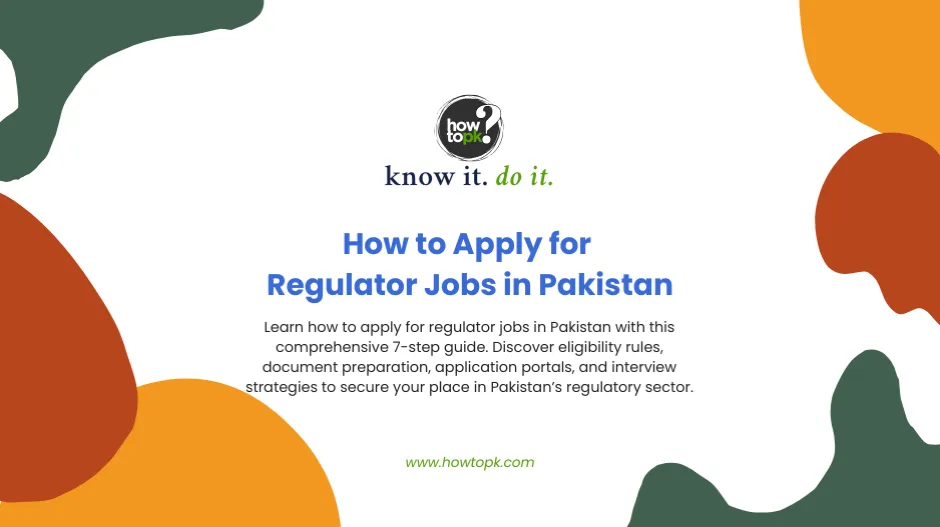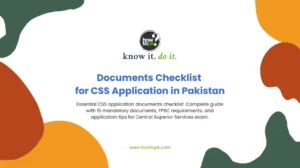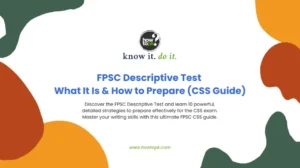If you want to build a meaningful career that combines stability with public impact, learning how to apply for regulator jobs in Pakistan is the first step. Regulatory jobs exist within government or semi-government bodies that supervise compliance and enforce standards across industries. Authorities such as the Drug Regulatory Authority of Pakistan (DRAP), the Securities and Exchange Commission of Pakistan (SECP), the Pakistan Telecommunication Authority (PTA), and the Islamabad Healthcare Regulatory Authority (IHRA) oversee sectors critical to health, finance, telecom, and governance.
These positions can include Assistant Directors, Compliance Analysts, Regulatory Affairs Officers, or Technical Officers. They not only provide attractive salary packages but also allow you to play a direct role in safeguarding consumer rights, ensuring market stability, and promoting public welfare.
Meeting Eligibility and Requirements
The first stage in applying is to fully understand eligibility criteria. Each regulator specifies qualifications, experience, and other requirements in its job postings. For example, DRAP often requires degrees in Pharmacy, Medicine, or Biomedical Sciences, while SECP favors applicants with backgrounds in Finance, Economics, Business Administration, or Law. Work experience in regulatory compliance, auditing, or industry-specific roles is frequently mandatory, along with certifications in specialized areas.
Most roles require a Pakistani domicile and carry defined age limits, though some exemptions apply for government employees. Language proficiency in both English and Urdu is usually essential, since regulatory work involves official documentation and communication. Always cross-check the details in the official advertisement, and make sure your degrees are attested by the Higher Education Commission (HEC).
Finding Genuine Job Openings
Knowing where to look is just as important as meeting the criteria. Authentic opportunities are posted on official portals such as DRAP Careers, SECP Careers, PTA Careers, and IHRA Careers. Broader government platforms like the National Jobs Portal and the Federal Public Service Commission also announce regulator vacancies.
For additional updates, job seekers can monitor trusted employment websites such as Rozee.pk, Indeed, and LinkedIn’s Pakistan jobs section. Subscribing to newsletters and alerts helps ensure you never miss a posting.
Preparing Essential Documents
A strong application begins with complete and well-organized documentation. Candidates must prepare a detailed CV tailored to the specific regulatory role, emphasizing relevant education, certifications, and professional achievements. Educational degrees and diplomas must be attested by HEC, and employers’ experience certificates should clearly state job responsibilities and tenure.
Applicants also need a valid domicile certificate, CNIC, and passport-size photographs. Some authorities require applicants to use customized forms, available on their websites. Ensure that all copies are clear and properly attested, and arrange them exactly as requested in the job advertisement to avoid delays in processing.
Navigating the Application Process
Most regulatory bodies in Pakistan have shifted to online applications for transparency. Candidates typically create an account on the relevant career portal, complete the form carefully, upload attested documents, and pay any application fee through approved methods. Saving the payment receipt and submitted form is important for future reference.
In some cases, hard copies must also be submitted by post. When this is required, candidates must attach certified documents, sign the form, and dispatch it via registered mail within the deadline. Failure to comply with these instructions often results in disqualification.
Preparing for Tests and Interviews
Applications are followed by screening tests, often conducted by the Federal Public Service Commission or HEC’s testing council. These exams assess general aptitude, sector knowledge, and analytical skills. Candidates who meet the cut-off are invited to interviews.
Interview panels usually consist of senior officials and HR representatives. Questions often cover sector-specific regulations, compliance issues, and problem-solving scenarios. Applicants should review the latest regulatory frameworks published by the concerned authority, practice behavioral questions, and prepare concise, structured answers. Using the STAR method (Situation, Task, Action, Result) helps demonstrate achievements clearly.
Tracking Your Application and Following Up
Staying engaged after submission is essential. Regulatory authorities frequently post shortlists, merit lists, and interview schedules on their official sites. Applicants must regularly check these updates and respond promptly to any requests for additional information. Missing deadlines or failing to follow up can disqualify even strong candidates.
Protecting Yourself and Your Rights
When learning how to apply for regulator jobs in Pakistan, it is vital to stay alert to scams. Only trust official sites and government portals. Fake recruiters may demand unofficial fees or misuse personal data. Always report such cases to authorities.
Pakistan’s recruitment policies are based on merit, and mechanisms exist to address grievances. If candidates feel unfairly treated, they can approach the respective regulator’s HR department or relevant oversight bodies.
Conclusion
Building a career in regulation requires dedication, preparation, and persistence. Mastering how to apply for regulator jobs in Pakistan involves meeting strict eligibility requirements, preparing flawless documentation, applying through trusted portals, performing well in tests and interviews, and staying alert to notifications. By following these steps, candidates can position themselves for success in roles that not only promise career growth but also contribute directly to the country’s governance and development.
For further guidance, candidates should explore official sites like SECP Careers and HEC Pakistan for degree attestation and testing details. With careful planning and commitment, applicants can secure positions that ensure professional stability while playing a vital role in strengthening Pakistan’s regulatory framework.







